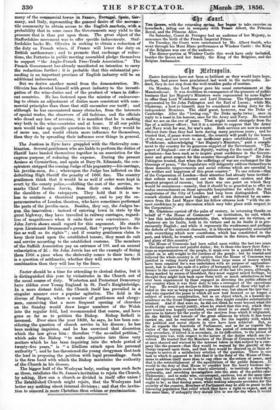Easter should be a time for attending to clerical duties,
but it is distinguished this year by vicissitudes in the Church out of the usual course of duty. Westerton and Protestant Democracy have ridden over Young England in St. Paul's Knightsbridge. In a more distant field, the Church itself has prevailed in a !singular manner over a popular agitation. The field is the diocese of Bangor, where a number of gentlemen and clergy- ppm, conceiving that a more frequent opening of churches on the Sunday would draw larger numbers of the Welsh into the regular fold, had recommended that course, and have gone so far as to petition the Bishop. Bishop Bethell is incensed. Ever since the year 1830, he says, he has been con- sidering the question of church service in his diocese ; he has been making inquiries, and he has exercised that discretion which the law gives him : therefore " the so-called petition," which asks the Bishop " to make inquiries into these very matters which he has been inquiring into the whole period of twenty-five years," is " a libellous attack upon his personal authority "; and he has threatened the young clergyman that took the lead in proposing the petition with legal proceeding. Such is the.firm hand with which the Bishop maintains the authority of the Church in his diocese.
The bigger half of the Wesleyan body, resting upon such facts as these, retaliates the St. James's invitation to rejoin the Church, by asking, How can a church so divided in itself offer union ? The Established Church might rejoin, that the Wesleyans had better say nothing about internal divisions ; and that the invita- tion to concord is more Christian than schism or recrimination.


























 Previous page
Previous page